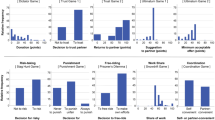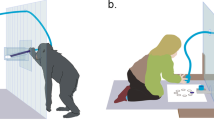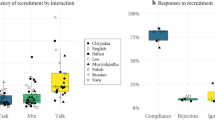Abstract
Arising from: J. B. Silk et al. Nature 437, 1357–1359 (2005); Silk et al. reply
Silk et al. report that adult chimpanzees show no difference in their choices in a situation where one choice benefits a familiar conspecific and the other does not1. From this, they conclude that chimpanzees are indifferent to the welfare of unrelated group members. But without additional data confirming that chimpanzees do choose differently in circumstances in which a difference would be expected, the authors cannot conclude that there is no difference in their scenario. How chimpanzees react to the welfare of unrelated group members remains an open question.
Similar content being viewed by others
Main
Silk et al. evaluate choice behaviour in adult chimpanzees given two options: one in which the actor is provided with food (1/0 option) and another in which both the actor and an unrelated adult chimpanzee in an adjoining enclosure are provided with food (1/1 option). They found no significant differences between the options: actors chose the 1/1 option 56% of the time (in the Louisiana group) or 48% (in the Texas group) when there was no chimpanzee in the adjoining enclosure and 58% (Louisiana) or 48% (Texas) of the time when there was another chimpanzee in the adjoining enclosure.
In a control experiment in which food was available for only one option, actors chose that option 92% of the time when they were alone and 94% of the time when another chimpanzee was in the adjoining room. This showed that actors were responding to the presence of food in the dish that became available to them.
However, we contest that the authors' conclusion that chimpanzees are indifferent to the welfare of unrelated group members is flawed, because it depends on the null hypothesis. A failure to observe different behaviours in the two different conditions does not prove that those two conditions will always yield the same result. More evidence is needed that chimpanzees choose to benefit a conspecific in conditions in which they would be expected to show such a preference. For example, would chimpanzees choose the 1/1 option more frequently when a genetically related chimpanzee is in the adjoining chamber? Without supporting information of this type, the authors' premise — that, if chimpanzees are concerned for another's welfare, they should choose the 1/1 option more often when another chimpanzee is present than when they are alone — is unsubstantiated.
Silk et al. address a question with implications for the evolution of altruistic behaviour in humans and other primates. This makes it all the more important that their conclusions should be backed up by strong evidence.
References
Silk, J. B. et al. Nature 437, 1357–1359 (2005).
Author information
Authors and Affiliations
Corresponding author
Rights and permissions
About this article
Cite this article
Beninger, R., Quinsey, V. Chimpanzee choice and prosociality. Nature 440, E6 (2006). https://doi.org/10.1038/nature04758
Published:
Issue Date:
DOI: https://doi.org/10.1038/nature04758
This article is cited by
-
Chimpanzee choice and prosociality (Reply)
Nature (2006)
Comments
By submitting a comment you agree to abide by our Terms and Community Guidelines. If you find something abusive or that does not comply with our terms or guidelines please flag it as inappropriate.



